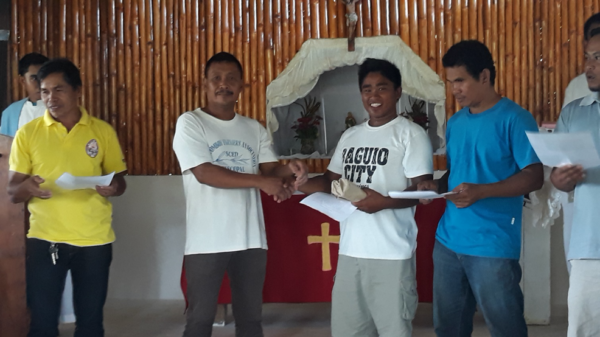ABM Archive Website
THIS WEBSITE CONTAINS ARCHIVE MATERIALS FOR HISTORICAL REFERENCE ONLY
For up-to-date information, including our latest appeals, news, and resources, please visit our current website.
FROM POVERTY TO WEALTH CREATION IN THE PHILIPPINES
A closer look at ABM’s Asset-based Community Development Project in the Philippines
Piglets for pig-raising, seeds and tools for vegetable gardening – even capitalizing a local store that sells boots, raincoats, and umbrellas. That’s how one farming group in the Philippines – Shalom Farmers Association – used the first 300,000 pesos (about $9,000) that they borrowed through E-CARE’s Livelihoods project.
E-CARE’s program was evaluated in 2019. To check the overall program effectiveness and whether Shalom Farmers Association prospered, read on.
Partner Episcopal Community Action for Renewal and Empowerment (E-CARE)
Period evaluated July 2015 to December 2018
Date of evaluation December 2019
Project description
The project aimed to enable 800 households in 40 communities to overcome poverty and attain self-sufficiency through partnerships with communities and/or groups to create, establish and/or enhance opportunities for sustainable livelihoods. The project assisted groups of people to form community-based organisations which would be registered with the government. Using an assets, or strengths, based approach (ABCD), E-CARE worked with the groups to help them identify their assets, skills and resources, and to select livelihood activities which would increase their incomes and capital assets. They were able to access ‘Receivers to Givers’ (R2G) funding. This revolving fund provides the groups with low interest grants to build the livelihoods of their members, who are then encouraged to ‘grant back’ the money to another group or community so they may also benefit. Over the three and a half-year period, the groups used the grants to develop new and existing income-generation activities, including vegetable and rice cultivation, chicken and pig-raising, fishing, food-processing, handicrafts and retail outlets. E-CARE also provided the groups with training in gender equality, disability inclusion, child protection and environmental conservation.
Key results
44 communities ended up taking part in the project, as well as almost double the number of anticipated families (a total of 1,535), in the course of the three and a half-year project.
- 44 communities completed the ABCD process and began maximizing the use of their assets
- 51 organizations/cooperatives/groups have registered or are in the process of registration with relevant government authorities
- 58 organizations/cooperatives/groups are managing their respective livelihood projects with R2G funding. The livelihood activities include vegetable or rice production, livestock raising (swine and chicken), fishing, food processing, handicrafts and buy and sell activities.
- 1,351 households reported increased income from 6% to 59% from their livelihood activities, a two-thirds greater average increase over what was anticipated
- A further 184 households reported increased income by 3% to 5%
- 1,351 households were able to contribute an aggregate amount of 4,070,317 pesos (about $125,000) share capital to their respective organizations or cooperatives, a two-thirds greater average increase over what was anticipated.
- 44 communities have gone through at least two days of awareness-raising seminars on the concepts of gender equality, environmental sustainability, disability inclusion and child protection in all activities.
- 42 groups have undertaken environmental conservation activities including natural farming practices, climate change mitigation (tree/mangrove planting, alternate wetting and drying technologies) and Disaster Risk Reduction team formation
Key Impacts
- Access to cheap loans. Through the revolving fund, the project gave community groups access to low interest loans or ‘grants’, not available elsewhere. E-CARE refers to these loans as ‘grant backs’ and to the interest as ‘add-ons’. This was to change mindsets from repaying a loan to a more positive responsibility to pass on a grant to another community group.
- Build-up of capital. The program enabled community groups to build up the capital assets of the individual members as well as their organizational capital. Two groups had become financially independent and stable to the point where they would no longer need to rely on external funding.
- New behaviours and structures in the communities. From 2015-2018, a total of 44 community groups were organized. These had each developed a mindset of identifying and utilising their existing assets rather than focussing on what they might have lacked. The project also empowered women (most of the members were women) and developed a mindset of mutual assistance.
Recommendations
- As community groups manage increasing amounts of R2G funds and increase the number of their members accordingly, they will require higher and more complex management knowledge, skills and processes. E-CARE should assist them to evolve their organizational structures from simple to complex.
- The revolving (R2G) fund could be grown by attracting social investments. This would enable the program to extend R2G to new communities, while fostering operational self-reliance.
Short Case Study
But did Shalom Farmers Association actually prosper from their 300,000 peso loan? The farmers related with great pride how they repaid the loan on schedule, then took out a further 600,000 peso loan at the same low interest rate. Their pig breeding and vegetable-farming businesses were sufficiently profitable that they were also able to repay the second loan on schedule. Some were even able to purchase land or pay off older debts to private money lenders. One purchased a vehicle, while another started her own potato wine making business. That’s not charity. That’s empowerment. And ‘granting back’ to another community or group enables the process to continue indefinitely.
ABM contracted an independent evaluator to conduct this evaluation of a project made possible by funding from ABM’s generous supporters and by the Australian Aid program #ANCP. ![]()

Krystal from Bontoc in the Mountain Province of the Philippines benefited from E-CARE’s Receivers to Giver’s policy.
© E-CARE, 2019.

In Mindanao, members of the Obial Farmers Association hand over 35,000 pesos to the New Calinog Farmers Association as part of the Receivers to Givers policy. © E-CARE, 2019.


